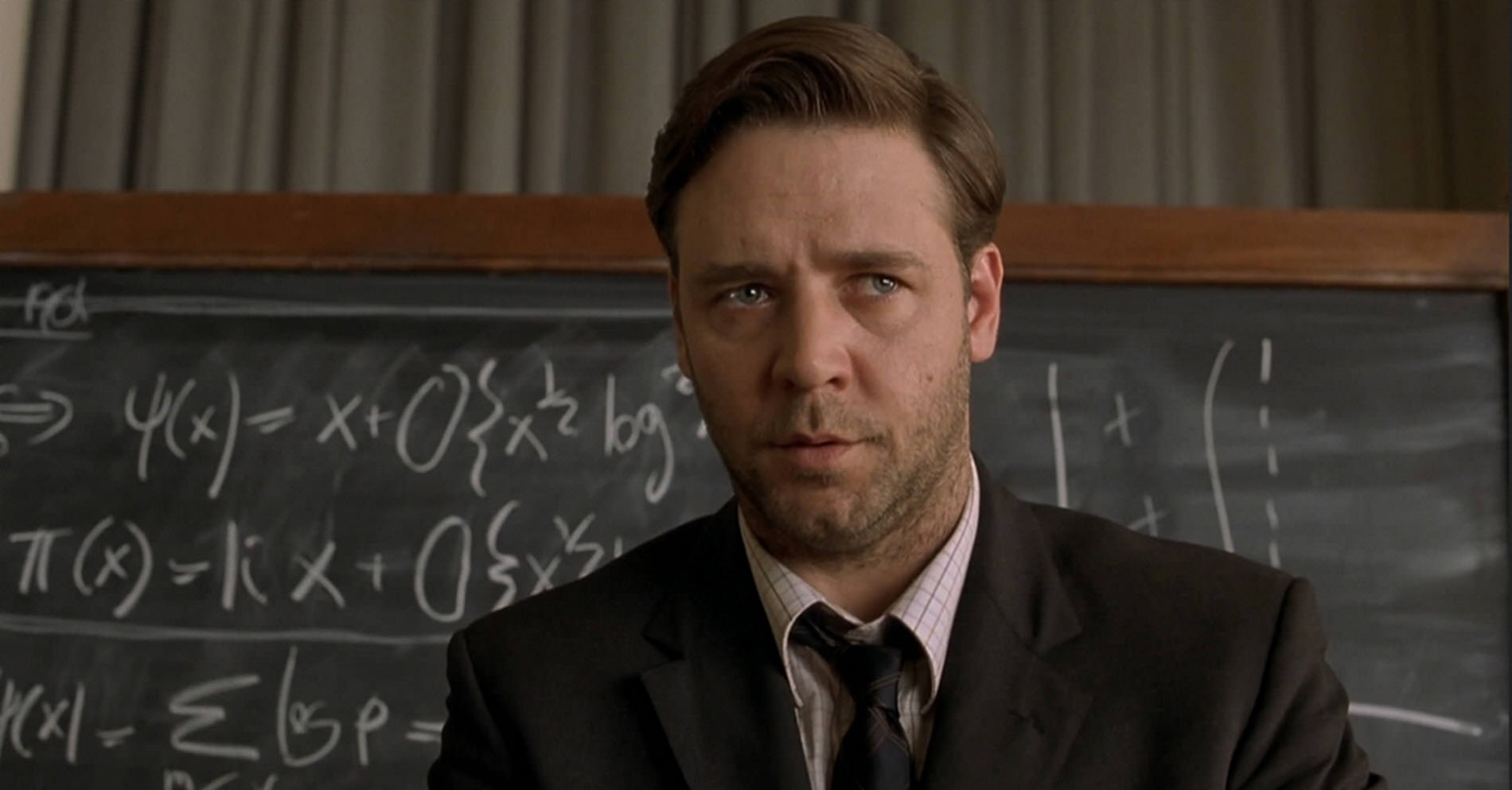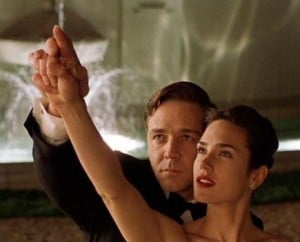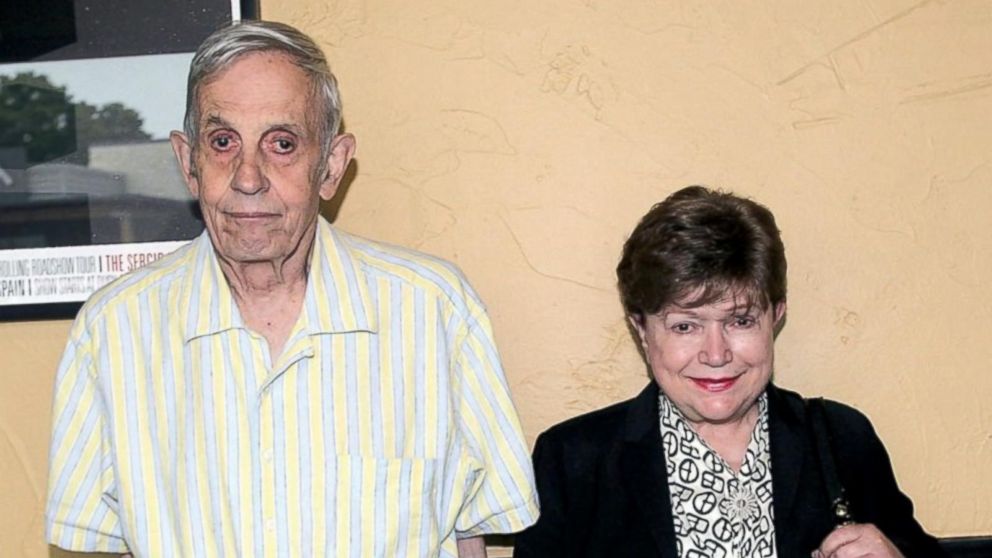A BEAUTIFUL MIND
I am told that A Beautiful Mind, the biopic of Nobel Prize-winning mathematician John Nash, is an inspirational story. I suppose it is, or at least as inspiration a film as has been made about an alleged antisemitic and alleged bisexual who fathered a child out-of-wedlock and divorced his El Salvadoran wife before remarrying her after winning the Nobel Prize.
Perhaps all that will be included in an Extended Edition.
It is one thing to change facts in any biopic for dramatic purposes. That is par for the course. What is more disturbing about A Beautiful Mind is how the film is almost wholly fiction or at least goes out of its way to leave a deliberately false impression for the sake of said dramatic purposes.
Brilliant but eccentric and socially inept Princeton University math student John Nash (Russell Crowe) is desperate to find something to make him stand out. He has a tenuous relationship with his fellow math students Sol (Adam Goldberg), Bender (Anthony Rapp) and his ultimate frenemy, Martin Hansen (Josh Lucas). Only his roommate Charles Herman (Paul Bettany) seems able to both tolerate and help him.
Eventually he does come up with something, an economic theory that upends Adam Smith's view of the competitive market. This allows him to work for Wheeler Labs, where he takes Sol and Bender. As part of the deal however, Nash has to teach at MIT, where he encounters the intelligent and beautiful Alicia Larde (Jennifer Connelly). She pursues him and fall in love.
Someone else pursues Nash: William Parcher (Ed Harris), a Department of Defense black ops agent. He tells Nash the Soviets have implanted codes in various newspapers and magazines about an upcoming nuclear bombing inside the U.S. and recruits Nash to be his code-breaker. All this, however, is hush-hush.
 It's well over an hour into our two-hour running time that we find the actual truth: John Nash is bonkers. That is wildly unfair: we actually find that Nash suffers from paranoid schizophrenia which had gone undiagnosed for decades. Charles, Parcher and Charles' niece Marcee (Vivien Cardone) were never real.
It's well over an hour into our two-hour running time that we find the actual truth: John Nash is bonkers. That is wildly unfair: we actually find that Nash suffers from paranoid schizophrenia which had gone undiagnosed for decades. Charles, Parcher and Charles' niece Marcee (Vivien Cardone) were never real.Alicia now has to work with her husband's mental illness, with help from Dr. Rosen (Christopher Plummer) who was the first to find Nash's problems. Nash for his part struggles bouncing between what is real and what is not, slipping into his Parcher paranoia until he accepts the situation.
Eventually he starts crawling out of his delusions by ignoring them altogether. He also turns to his frenemy Hansen, now the head of Princeton's mathematics department. At first just auditing classes and allowed to set up informal shop at the university library, Nash soon starts giving actual classes and ultimately wins the Nobel Prize in Economics, where he gives a moving speech honoring his devoted (and long-suffering) wife Alicia and finding it is good to have a beautiful mind but better to have a beautiful heart.
I remember when I saw A Beautiful Mind in theaters and the feeling I had then about it is the same feeling I have now about it. There was something that just did not sit well with me about the 'twist' in the film. A Beautiful Mind felt then and still feels now very deceptive and misleading, as if director Ron Howard and screenwriter Akiva Goldsman (adapting Sylvia Nasar's Nash biography) were dead-set on pulling a fast one on audiences.
I look at how the DVD back cover describes the plot. "A Beautiful Mind stars Russell Crowe in an astonishing performance as brilliant mathematician John Nash, on the brink of international acclaim when he becomes entangled in a mysterious conspiracy. Now, only his devoted wife (Academy Award winner Jennifer Connelly) can help him in this powerful story of courage, passion and triumph".
A Beautiful Mind is none of those things. The plot description isn't even accurate, or at least suggests the story is about Nash's "work" for the Pentagon when said "work" is clearly in his affected mind. Worse, the film not only won't give us any hints that much of the story is really Nash's delusions but insists on keeping up the false front even past when Nash is locked up in an asylum.
 You get the sense Howard and especially Goldsman wanted to keep the deception going. I keep feeling cheated and lied to even though I know their intention is to give us the world through Nash's eyes. To be fair, they play things in a plausible way yet I wonder if all that was necessary.
You get the sense Howard and especially Goldsman wanted to keep the deception going. I keep feeling cheated and lied to even though I know their intention is to give us the world through Nash's eyes. To be fair, they play things in a plausible way yet I wonder if all that was necessary.Would it not serve the film and audiences better if we got some hints that things were not as they appeared to be versus being hit with 'a shocking twist' a bit past the midpoint?
A Beautiful Mind also flat-out lies or shades the truth beyond making Nash's mental health crisis deliberately opaque. It goes beyond the obvious misdirection about the story. As mentioned A Beautiful Mind deliberately leaves a false impression of Nash. Who would have thought Alicia Nash was from El Salvador? Would we think Nash's story was triumphant if we had learned that he abandoned a child and the child's mother, or that contrary to the film's suggestion Alicia and John divorced long before he won the Nobel Prize?
Even if his arrest for indecent exposure as part of a sting in a public restroom or his alleged antisemitic writings were done in the grips of his mental instability, why insist on presenting an illusion to demonstrate an illusion?
I don't mind being deceived if it's made clear I'm being deceived. I mind greatly being misled with not just half-truths but deliberate omissions to paint a false portrait.
A Beautiful Mind does not make a case as to why Sol or Bender would happily go along with Nash given the times they interact with him is primarily to ridicule him. The idea that Nash and Hansen are friends is as delusional as Nash's friendship with the fictitious Charles. I'd say the idea of Nash and Hansen being friends is more delusional than Nash and Charles' faux-friendship.
I think almost all the performances were flat and/or one-note. This is the case with Rapp, Goldberg and Lucas, though to be fair to them their characters were similarly flat and/or one-note. Harris too played what seems a stock character: the tough secret and shadowy agent. Again to be fair given he was an illusion one shouldn't expect a great deal of backstory to Parcher.
I think Bettany and Plummer gave the best performances because they seemed like real people even if the former was not real. Despite the praise she received up to a Best Supporting Actress Oscar, I found Connelly a bit breathy as Alicia (who has been whitewashed in more ways than one). She looked on admiringly or distraught at her husband but that's it.
Crowe was strong but struggled with whatever effort he made at a West Virginia accent, which was mercifully dropped. Without meaning to sound harsh he did look a bit old to be a college student in the beginning (he was 37 at the time). Once again to be fair so did Rapp, Goldberg and Lucas, but why quibble?
Even the film's defenders find it hard to defend A Beautiful Mind's ghastly makeup, though James Horner's score did capture the complex world of math.
A Beautiful Mind is fiction with a thin veneer of fact. That, along with the film's stubbornness in leading us down a false road with no hint about the truth still irks me. Perhaps a fuller, more open version where we see some warts might have made it better.
 |
| John Nash: 1928-2015 Alicia Nash: 1933-2015 |
DECISION: D+
2002 Best Picture Winner: Chicago

No comments:
Post a Comment
Views are always welcome, but I would ask that no vulgarity be used. Any posts that contain foul language or are bigoted in any way will not be posted.
Thank you.